UN agency reverses position on masks as China accuses Australians of COVID-19 racism
China has ordered its highest level of protection for an animal believed to be at the heart of the COVID-19 pandemic, as it warns against travel to ‘racist’ Australia.
Coronavirus
Don't miss out on the headlines from Coronavirus. Followed categories will be added to My News.
- The countries trying to get into our travel bubble
- Aussies could holiday in New Zealand before Queensland
China is ordering its highest level of protection for the armadillo-like pangolin as part of its crackdown on the wildlife trade following the global coronavirus pandemic.
While the virus is believed to have originated in the central Chinese city of Wuhan, most scientists say it was most likely transmitted from bats to humans via an intermediary animal such as the pangolin.
The order from the National Forestry and Grassland Administration does not explicitly mention the virus outbreak as a reason for the measure, but the timing appears to indicate that was a consideration.
Pangolin meat is considered a delicacy by some Chinese and its scales are used in traditional Chinese medicine.
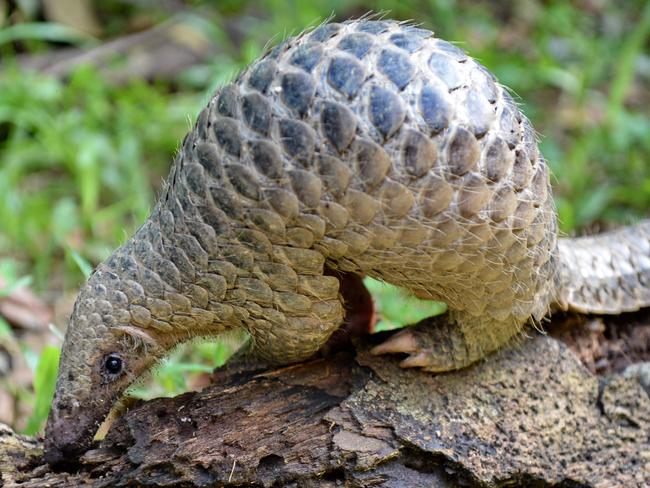
DON’T TRAVEL TO ‘RACIST AUSTRALIA: CHINA WARNS
China’s Ministry of Culture and Tourism has advised the public to avoid travelling to Australia, citing racial discrimination and violence against Chinese people in connection with the COVID-19 pandemic.
“There has been an alarming increase in acts of racial discrimination and violence against Chinese and Asians in Australia, due to the impact of the COVID-19 pandemic,” the ministry said in a statement on Friday evening.
It did not give any specific examples of such discrimination or violence, according to correspondent Anirudh Saligrama.
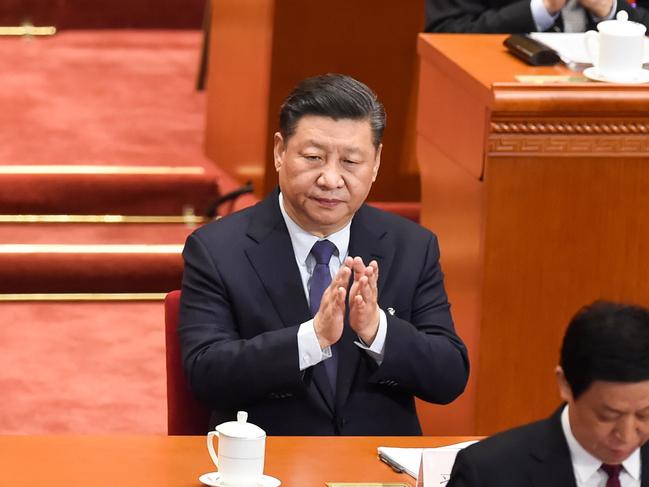
China issued a warning to tourists travelling to the US earlier this year after some said they were mistreated in connection with the outbreak.
It comes as the World Health Organisation broadened its recommendations for the use of masks during the coronavirus pandemic and said Friday it is now advising that people should wear fabric masks when social distancing is not possible, such as on public transportation and in shops.
WHO Director-General Tedros Adhanom Ghebreyesus said people over age 60 or with underlying medical conditions also should wear masks in situations where social distancing cannot be maintained.
WHO previously had recommended that only health care workers, people with COVID-19 and their caregivers wear medical masks, noting a global shortage of supplies.
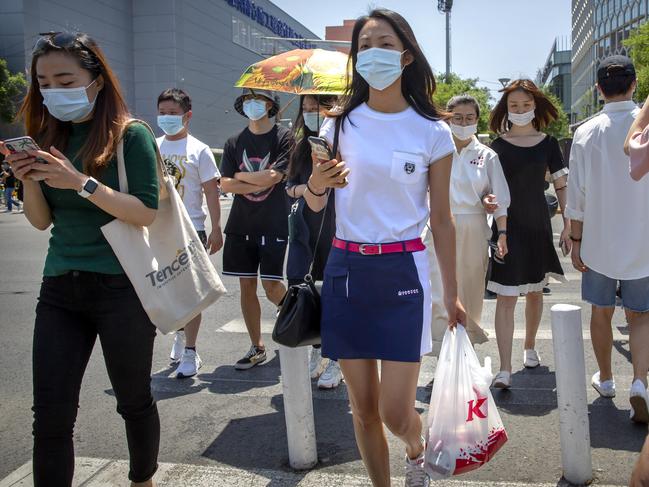
During a press briefing discussing the revised guidance, Mr Tedros added that “masks on their own will not protect you from COVID-19” and emphasised the importance of handwashing, social distancing and other infection-prevention strategies.
WHO also widened its mask guidance to specify that health workers in areas where the virus is spreading freely should always wear masks inside medical facilities.
Doctors working in cardiology or other wards, for example, should wear medical masks even if the facilities had no known coronavirus patients, Mr Tedros said.
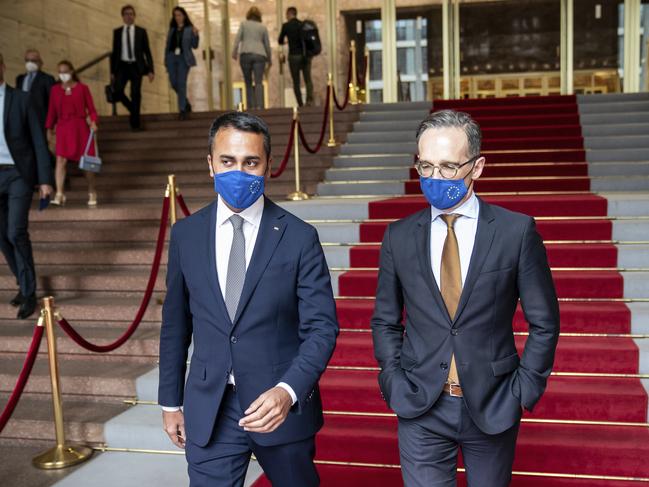
Maria Van Kerkhove, WHO’s technical lead on COVID-19, said the updated recommendations were based on new research commissioned by the U.N. health agency.
Other health agencies, including the U.S. Centers for Disease Control and Prevention, have recommended for some time the wearing of masks or face coverings by the general public to slow the spread of the coronavirus. British authorities said this week that face coverings would be compulsory on subways and other mass transit.
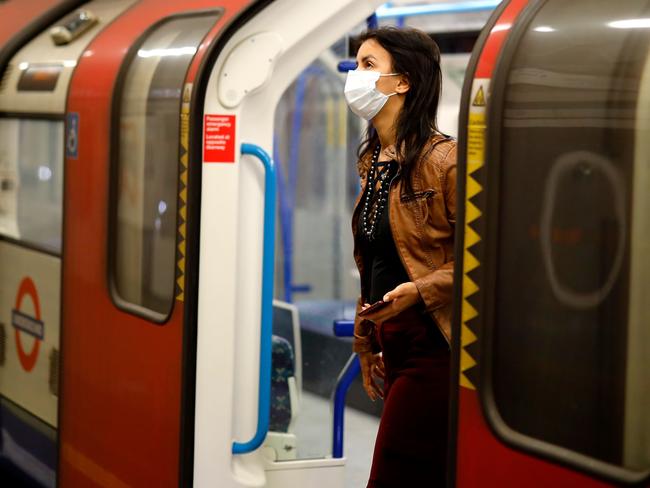
April Baller, a WHO infection control expert, said the type of masks recommended for the general public are fabric or cloth coverings that can be made at home. She said part of the reason for the widening of WHO’s advice on face masks was the increasing evidence COVID-19 can be spread by people before they have symptoms.
WHO previously said that transmission from people who do not have symptoms was not believed to be a major driver of the virus pandemic.
“What (the masks) do is they prevent a person who may actually have the disease from transmitting it to somebody else,” Baller said.
BRENDAN MURPHY WARNS AUSSIES AGAINST PROTESTS
The Federal Government’s Chief Medical Officer Brendan Murphy has warned Australians against taking part in the Black Lives Matter rallies saying large gatherings are “fundamentally dangerous”.
He echoed Prime Minister Scott Morrison’s words to avoid going to mass gatherings, where COVID-19 could spread.
“A mass gathering, even if people try to make it safe by trying to practise distancing and hand hygiene, is inherently dangerous because people can’t really keep apart,” he said.
“They can’t stop touching each other. We don’t know who is there. We can’t contract trace. “Avoid mass gatherings.”
Prof Murphy said one high viral load person, can infect 30 to 40 people.
Health Minister Greg Hunt is also urging people not to attend the protests.
“It is fundamentally important for people to be able to express their democratic right,” he said.
“But a mass gathering whether it is a protest or a football match … at this time is not safe.
“It undermines and risks all of the work that Australians have done to save lives and protect lives.”
Mr Morrison has also called on Australians to “respect their liberty” and not join Black Lives Matter rallies planned this weekend.
He said liberty came with responsibility, particularly after Australians went through the “absolute agony” of not being able to attend funerals during the coronavirus crisis.
“Australians owe all those Australians a great duty of responsibility, so I say to them, don’t go,” Mr Morrison said.
He said he had spoken this morning to Victorian Premier Daniel Andrews and New South Wales Premier Gladys Berejiklian about the proposed protests.
He said he understood the operational decisions made on public order grounds by police.
“Let me be clear … while those public order decisions have been made, that’s not an invitation or a licence for this,” Mr Morrison said.
“The health risks of gathering in such large numbers … are real.”
Mr Morrison said there was a health risk to those who attend, which could lead to an increase in COVID-19 cases.
“Let’s find a better way and another way to express these sentiments, rather than putting your own health at risk, the health of others at risk, the great gains we have been able to make as a country in recent months, and let’s not forget the terrible economic consequences of that as well, let’s not put that at risk, let’s exercise our liberties responsibly,” he said.
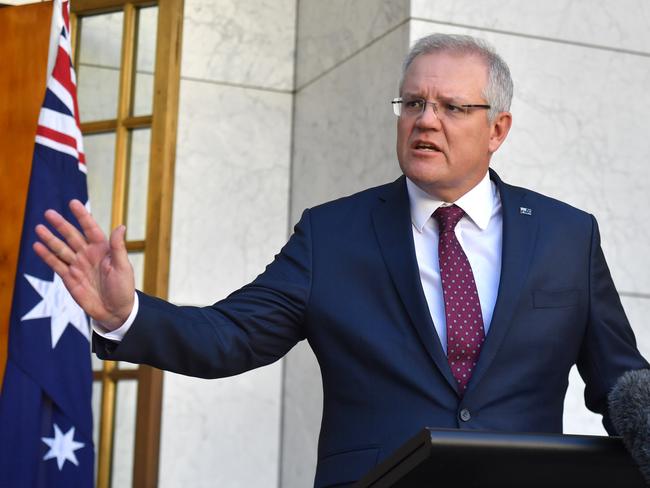
Mr Morrison and Treasurer Josh Frydenberg have also confirmed the JobKeeper wage subsidy would exist until September, but would undergo a review in its first three months.
Mr Morrison and Mr Frydenberg also announced foreign investment reforms that will protect Australian businesses.
Mr Frydenberg said reforms fall into three key areas and include creating a new national security test.
“Foreign investors, not just foreign Government investors, should be subject, and will be subject, to the Foreign Investment Review Board review when they are investing in what is termed a sensitive national security business,” he said.
It affects telecommunications sector, businesses that are covered by the security of Critical Infrastructure Act, including energy and sensitive utilities businesses.
Businesses within the defence supply chain and businesses that collect, store and own data that is critical to Australia’s national security and defence are also included.
“The Treasurer will also have a new power where he can call – he or she can call in an investment if it creates a national security risk and if that business is not covered by that definition,” he said.
The Treasurer will also have a last-resort power to vary or to impose conditions or as a last resort to force a divestment in a very limited number of exceptional cases.
The second part of the reform is to strengthen compliance and penalties. The third part is streamlining the approval process for passive investments by foreign governments where they are partnering with private capital.
“These measures have been decided and designed by the Australian Government. Not by anyone else,” Mr Frydenberg said.
“We have taken these steps today to enhance and protect the national interest. With respect to consultation with other countries, we have, through diplomatic channels, informed some of our key partners about these changes, explain the context for them, as you would expect us to do.”
TRUMP TRUMPETS SURPRISE UNEMPLOYMENT DROP
US President Donald Trump seized on better than expected jobs numbers to say America’s COVID-19 recovery had begun and again pushed for states to re-open.
The May job report bucked predictions it would reach close to 20 per cent, and instead was 13.3 per cent.
While that number was still close to historic levels, it far exceeded expectations and led an almost 4 per cent jump in the Dow.
“This shows that what we’ve been doing is right,” Mr Trump said at the White House.
“This is outstanding what’s happened today.”
Mr Trump pitched himself as key to what he claimed would be a “rocket ship” economic rebound, and offered that as an argument for his re-election in November.
“I’m telling you next year, unless something happens or the wrong people get in here, this will turn around,” Mr Trump said.
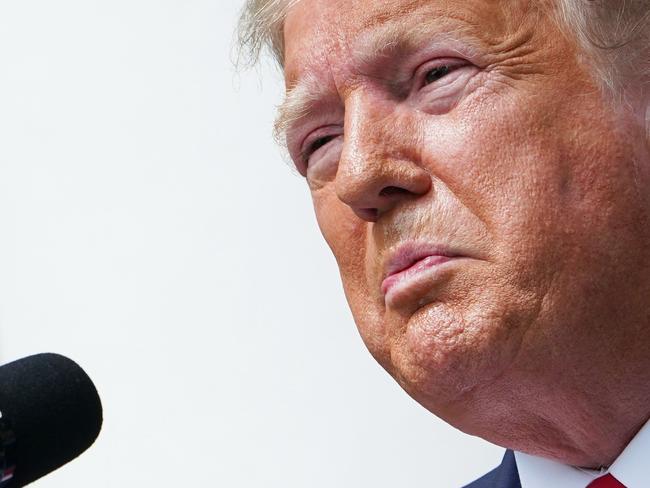
It’s unclear how many jobs lost as a result of the pandemic are permanently lost, or whether the reopenings in states will create a second surge of COVID-19 deaths.
In addition, the report from mid-May doesn’t reflect the effect that protests across the nation have had on business.
Some economists forecast the rate could remain in the double-digits through the November elections and into next year.
Mr Trump predicted a swift bounce-back for an economy that was largely shuttered to slow the spread of the virus, saying the economy would see a “very good” July and August and a “spectacular” fall.
“We’ll go back to having the greatest economy anywhere in the world,” he said.
SURPRISING JOB GAIN IS GOOD NEWS FOR THE US
The US government said on Friday that the economy added 2.5 million jobs last month, driving unemployment down from 14.7 per cent in April.
The May job gain, which confounded economists’ expectations of another round of severe losses, suggests that thousands of stores, restaurants, gyms and other companies reopened and rehired more quickly than many analysts had forecast.
Still, it raises a key question for businesses and unemployed workers: How fast will the rebound proceed?
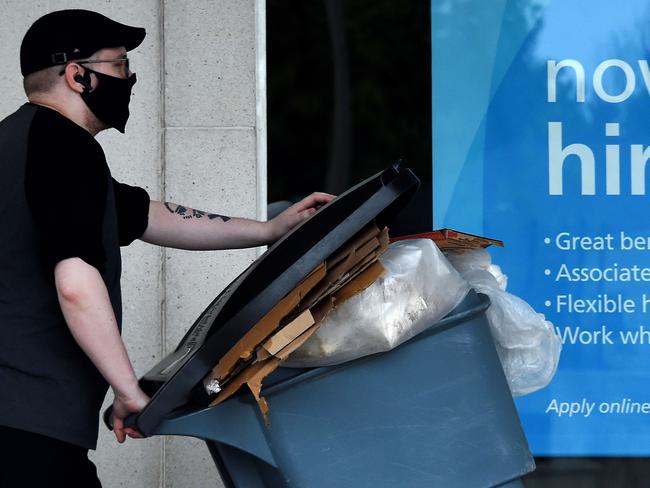
For hiring to continue at a solid pace, businesses will probably need to see signs that consumers are starting to resume their pre- outbreak habits of shopping and dining out.
Other evidence has also shown that the job-market meltdown triggered by the coronavirus has bottomed out.
The number of people applying for unemployment benefits has declined for nine straight weeks. And the total number of Americans receiving such aid has essentially levelled off.
The overall job cuts have widened economic disparities: While the unemployment rate for white Americans was 12.4 per cent May, it was 17.6 per cent for Hispanics and 16.8 per cent for African-Americans.
Even with the surprising gain in May, it may take months for all those who lost work in April and March to find jobs. Some economists forecast the rate could remain in double-digits through the November elections and into next year.
For weeks, economists had warned that unemployment in May could hit 20 per cent or more. The street protests over George Floyd’s killing that led to vandalism and looting in dozens of cities did not affect Friday’s figures, which were compiled in the middle of May.
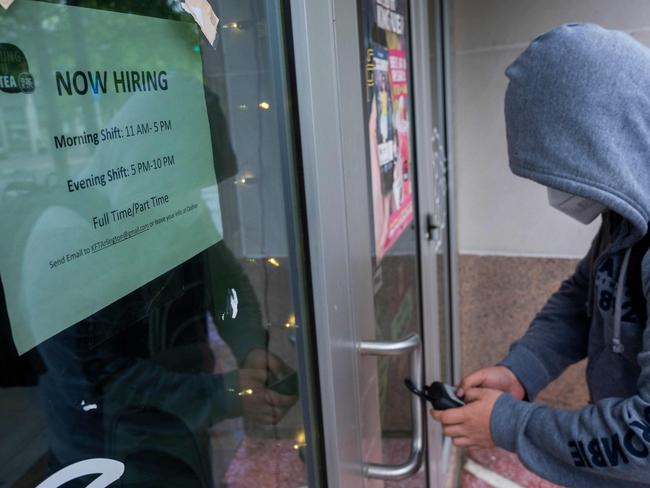
But business closings related to the unrest could show up in the June report.
A few businesses are reporting signs of progress even in hard-hit industries.
American Airlines, for example, said this week that it will fly 55 per cent of its US routes in July, up from just 20 per cent in May.
And the Cheesecake Factory restaurant chain said one-quarter of its nearly 300 restaurants have reopened, though with limited capacity.
Sales are at nearly 75 per cent of the levels reached a year ago, the company said.
Erica Groshen, a labour economist at Cornell University and a former commissioner of the Labor Department’s Bureau of Labor Statistics, said hiring could ramp up relatively quickly in the coming months and reduce unemployment to low double-digits by year’s end.
“Then my inclination is that it will be a long, slow slog,” she said.
Until most Americans are confident they can shop, travel, eat out and fully return to their other spending habits without fear of contracting the virus, the economy is likely to remain sluggish.
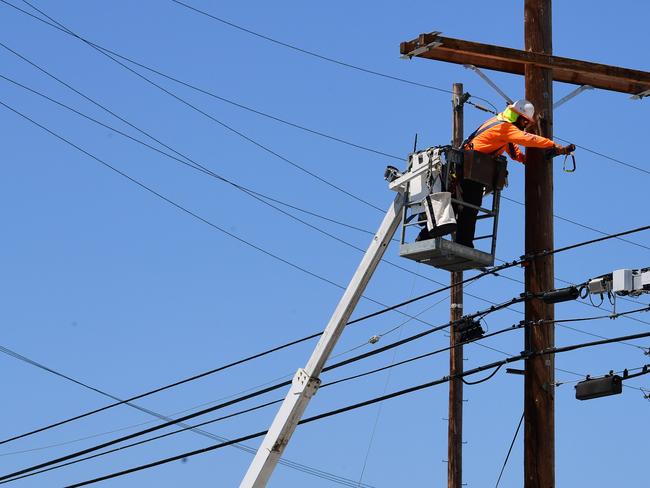
Gwyneth Duesbery, 22, returned this week to her job as a restaurant hostess in Grand Rapids, Michigan, as Bowdie’s Chop House prepares to reopen with tables 6 feet apart and seating capacity reduced to about one-quarter.
“I am concerned that it will expose me to potential diseases, and expose others, no matter the precautions that we take,” she said.
“It’s kind of uncharted waters.”
UK PM MAY HAVE COVID-19 AGAIN
British Prime Minister Boris Johnson held a 45-minute socially distanced meeting with business minister Alok Sharma just hours before Mr Sharma was taken ill and tested for the coronavirus, Mr Johnson’s spokesman says.
The spokesman said Tuesday’s meeting in Mr Johnson’s Number 10 Downing Street offices was also attended by finance minister Rishi Sunak, and that Mr Johnson would follow medical advice if Mr Sharma’s COVID-19 test result came back positive.
“The meeting which took place in Number 10 – I believe it was in the Cabinet Room – was properly socially distanced, so they were all two metres apart,” he said.
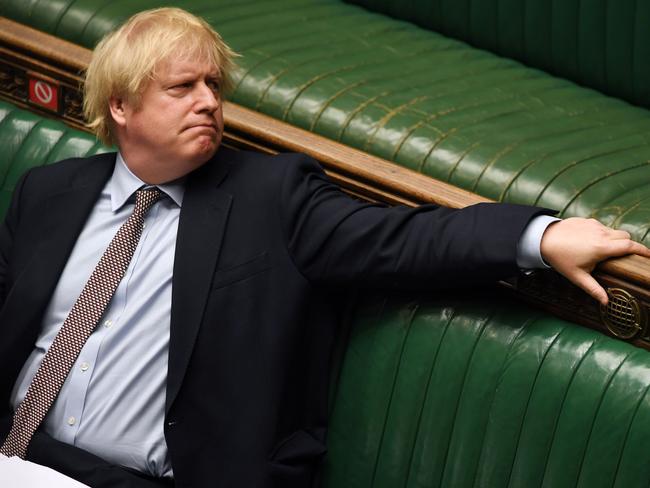
“If the Secretary of State (Sharma) were to test positive for coronavirus then he will go through the test and trace process and follow the advice which they give to him.”
Mr Johnson has already contracted and recovered from COVID-19, but there is no certainty that would give him immunity.
It is hoped that Mr Johnson does not become reinfected with the coronavirus.
The government was in tatters when he was sick and it would be another setback amid growing worries over the UK economy and Brexit.
It also raises questions about whether or not getting COVID-19 provides the infected with any immunity.
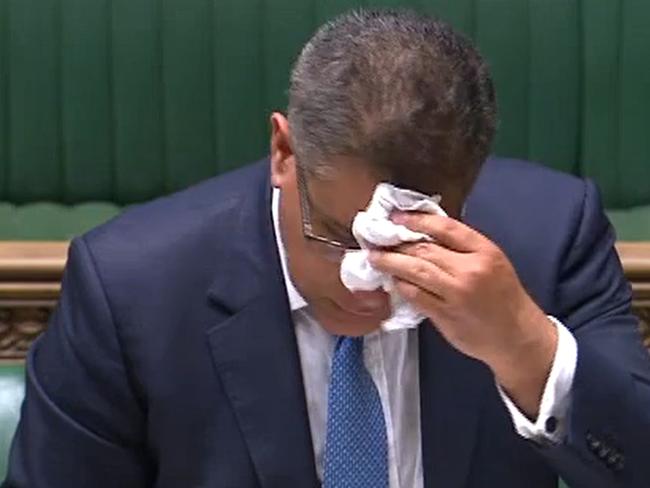
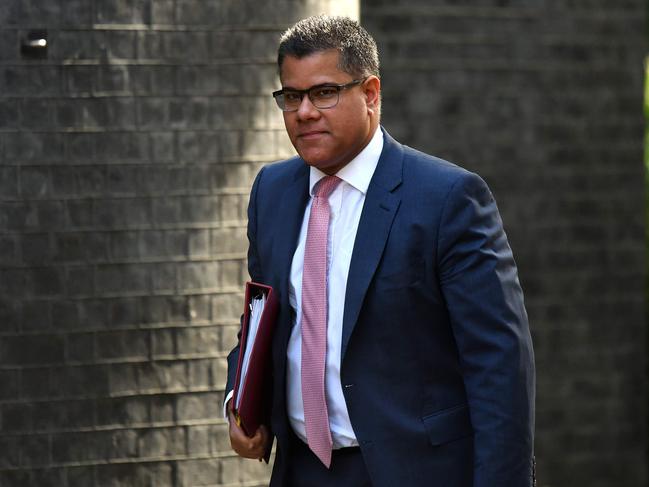
The new threat comes as Mr Johnson came under fire for his two-week foreign quarantine plan.
Mr Johnson defended the plan, insisting that it was necessary now that Britain was “getting the virus under control”.
He added that there was a “risk” of cases from abroad increasing the infection rate in Britain. “We therefore need to take steps now to manage that risk of these imported cases triggering a second peak,” he said.
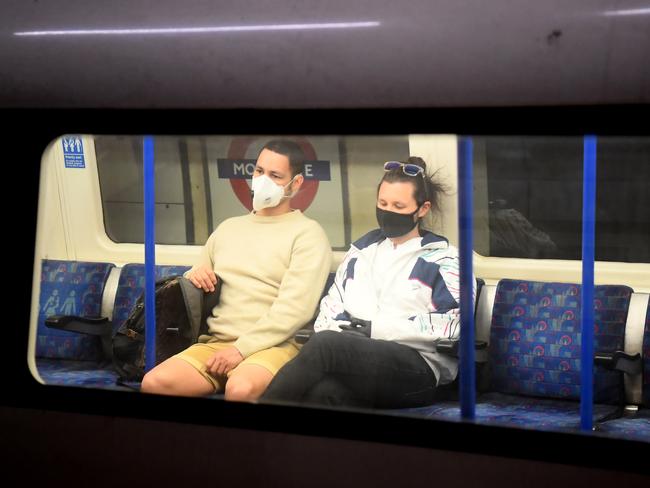
To that extent, passengers on England’s buses, subways and trains will have to wear face coverings starting June 15 to help protect fellow passengers from the coronavirus.
British Transport Secretary Grant Shapps said on Thursday local time that the requirement was timed to coincide with the anticipated reopening of non-essential stores.
With more shops, including department stores and electronics retailers opening for the first time in nearly three months, there will likely be an increase in public transportation use.
He said the face coverings are a “condition of travel” and failure to abide by the requirement could potentially lead to fines.
The government reported that another 176 people who have tested positive for the coronavirus had died in the UK in all settings. That takes the UK’s total to 39,904, the world’s second-highest death toll in the pandemic.
MAJORITY BLAMES CHINA FOR GLOBAL PANDEMIC
Three out of four Australians, Brits and Americans blame China for the coronavirus pandemic, according to a new poll.
The poll, by global private investment firm Parabellum Investments, found that over half are less likely to buy goods and services from China as a result of the pandemic.
In Australia, public concern is highest, with 80 per cent blaming China for the disaster and 68 per cent of those now less likely to buy Chinese products.
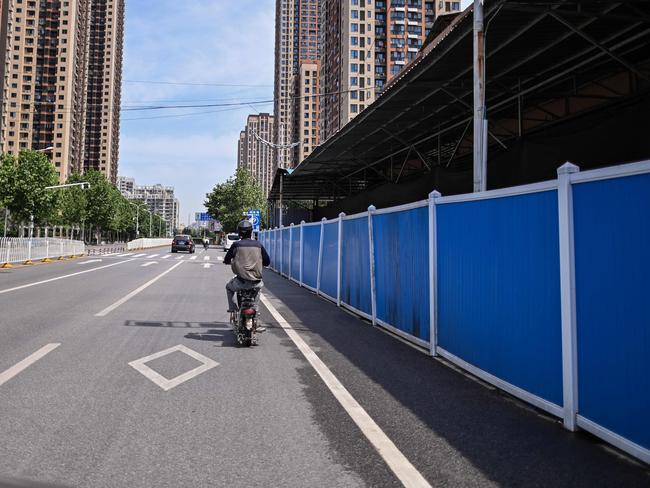
The research, undertaken for Parabellum Investments, comes amid political criticism over China’s role in the crisis and gives one of the first indications of how consumers may react.
Across all three leading Western economies, it reveals unexpectedly high levels of public concern.
“This pandemic has clearly demonstrated the dangers of Western economies being overly dependent on China,” said Rami Cassis, Founder and CEO of Parabellum Investments.
“This is already influencing international trade and prompting governments and enterprise to look for ways to guarantee supply of critical goods and services. We believe it will transform international supply chains and change today’s globalisation model relying on China as the world’s factory which will bring with it investment opportunities arising from reshoring and nearshoring.”
Asked whether they held the Chinese government responsible for the global spread of COVID-19, 77 per cent of consumers surveyed across all three countries said they did.
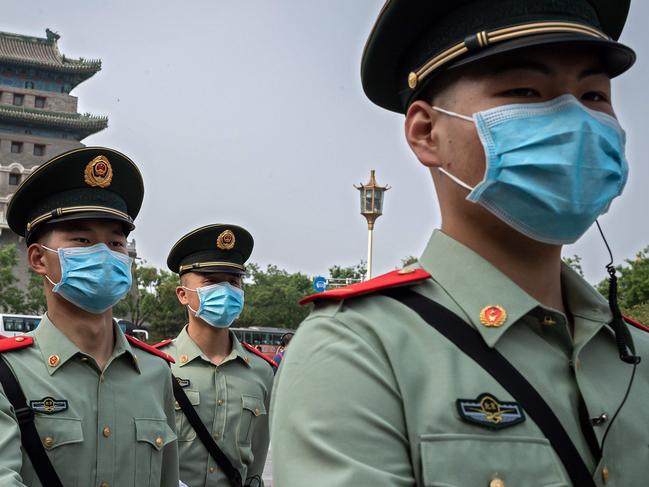
Although governments in the UK, US and Australia have responded differently, levels of public concern are strikingly similar across the three continents, with 80 per cent of Australian consumers blaming China for the crisis, against 77 per cent of in the UK and 73 per cent in the US.
The poll also reveals a clear link between consumers blaming China for spreading the pandemic and their purchasing intentions. Just over 60 per cent of respondents who hold China responsible for the global spread of COVID-19 say they are now less likely to buy Chinese goods and services.
The impact on buying intentions is evident in all three countries, but most evident in Australia, where 68 per cent of consumers blaming China for the pandemic said the pandemic has made them much or slightly less likely to buy goods and services from China.
“We think increasingly negative consumer attitudes to China will influence how major corporations reconfigure their supply chains in the wake of this pandemic,” Mr Cassis continued. “We expect many more to look for ways to source products and services locally, or from countries which are physically closer and culturally aligned.
Some of the regional winners gaining from China’s loss are expected to be India, North Africa, Eastern Europe & Belarus, Argentina & Mexico. While investment driving the reshoring and nearshoring trend is already afoot in pharmaceuticals and medical services, we also expect to see this happen in numerous other sectors.”
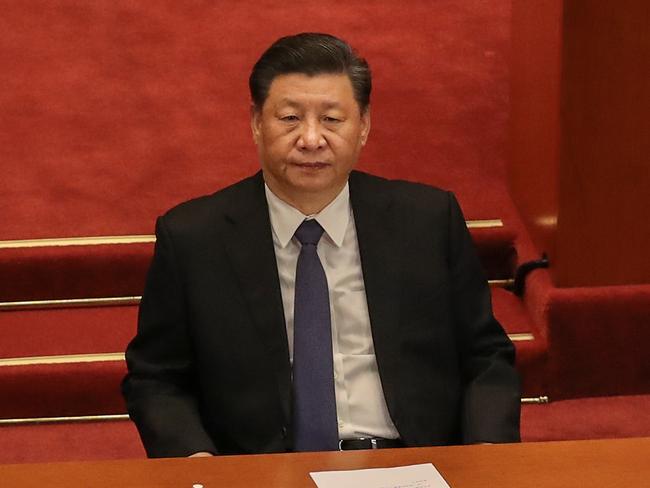
Parabellum Investments has recently acquired pharma-tech product serialisation firm advance based in the US, Belgium and Turkey. As part of its global portfolio, Parabellum Investment also has nearshore / offshore operations in Bulgaria, Turkey and multiple sites in India where it is seeking further acquisitions.
Originally published as UN agency reverses position on masks as China accuses Australians of COVID-19 racism
